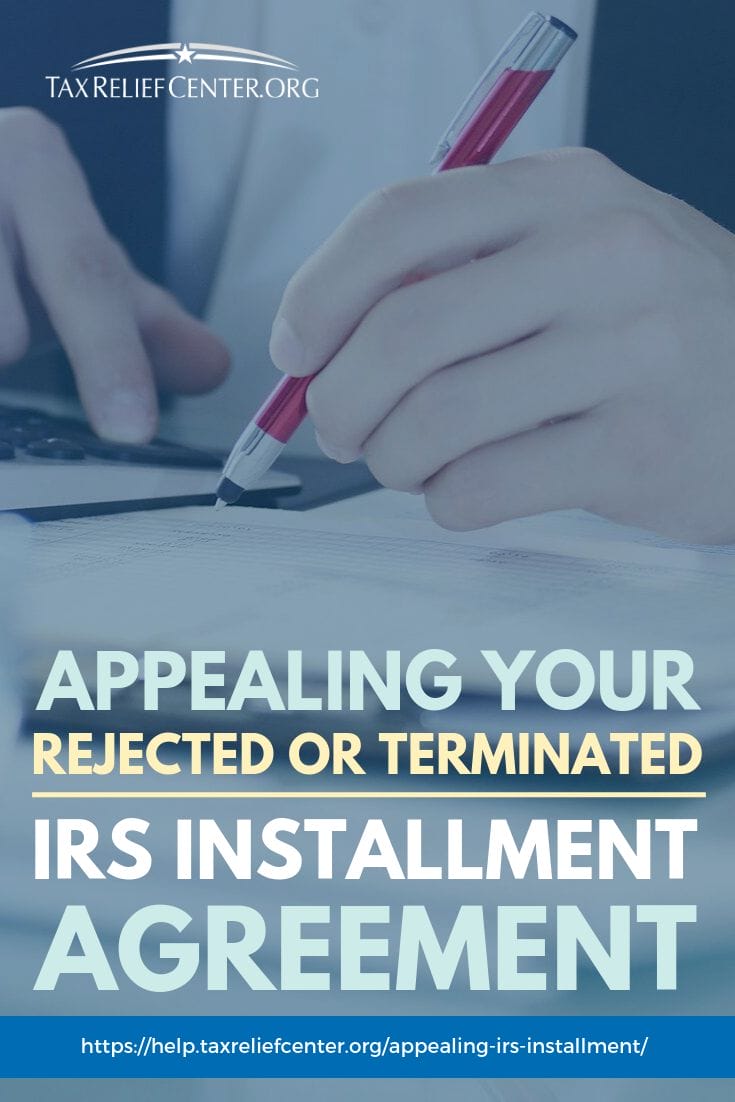Was your IRS installment plan request rejected? Review how and where to begin appealing a rejected or terminated installment agreement request here.
RELATED: IRS Installment Agreement Types | How Can It Help You
In this article:
- Considering an IRS Installment Agreement for a Tax Debt
- What If I Owe Taxes and Can’t Pay?
- What Is an IRS Installment Agreement?
- What Happens If I Can’t Pay My IRS Installment Agreement?
Appealing a Rejected Installment Agreement to Pay Tax Debt
Considering an IRS Installment Agreement for a Tax Debt
If you owe the IRS money, your situation may seem hopeless — especially if you owe them a lot of money. The good news is, though it doesn’t feel that way sometimes, the IRS wants you to help you find ways to ultimately pay what you owe.
They’ve provided various avenues, such as an IRS installment agreement, to help. If your initial application was rejected or terminated, appealing your rejected or terminated IRS installment plan may be your best course of action.
What If I Owe Taxes and Can’t Pay?

The sole function of the IRS is to get what is owed to Uncle Sam. They have abundant resources at their disposal to assist in this pursuit.
Owing money to the IRS is stressful for the average person, but it doesn’t have to be. Hardships happen, and the agency recognizes that.
Your goal, now, is to recover from that hardship and get back in the good graces of the IRS.
One of the tools that can help you do that is an IRS installment plan.
RELATED: What To Do When You Can’t Make This Month’s IRS Installment Payment
What Is an IRS Installment Agreement?
An installment agreement with the IRS is exactly what it sounds like. It’s an agreement between you and the government to repay the taxes you owe, in agreed-upon installments.
Each IRS installment payment brings you one step closer to your goal of being free and clear of your back tax debt to the government.
An IRS payment plan is not a get-out-of-debt-free card, though. You usually have to pay penalties and fees along with the installment payments, and you may need to work out an additional plan to avoid getting in this situation again in the future by making quarterly payments, for example.
IRS installment agreements are not guaranteed though, and you will be required to comply with a lot of procedures and paperwork to qualify for one. The good news, though, is that you can appeal a rejection, and as long as you are attempting to make arrangements, the IRS will not place levies on your property or garnish your wages.
IRS Wage Garnishment Definition: A legal process by the IRS that instructs an employer to withhold money from a taxpayer’s paycheck to pay back taxes.
However, if you do not honor your agreement, fall behind on your payments, or are rejected and do not quickly appeal, you may face those judgments. This is why it is so important that you work to create a manageable IRS installment agreement from the beginning.
What Happens If I Can’t Pay My IRS Installment Agreement?
From the IRS’ point of view, they’ve been kind enough to grant an extension for your debts in the form of an installment plan.
They are less forgiving when you cannot maintain your end of the agreement. If you do not repay the debt, as promised, or if future tax liabilities go unpaid while you are making installment payments, the IRS may consider you in default of your agreement.
There are other reasons the IRS may consider you in default, including:
- cannot provide requested financial documentation
- failure to offer an updated financial statement when corrected
- failure to pay modified IRS payments required when the IRS deems your income sufficient to warrant increased monthly payments
The IRS will notify you in writing that you have 30 days to comply with the terms of your agreement before terminating the agreement. That means you have 30 days to bring your agreement up to date.
If you do so, the IRS may reinstate your installment agreement.
If the IRS decides against reinstating the initial installment agreement, you may appeal, and you have the option to request a hearing with the IRS Office of Appeals.
The key for you is to make sure you have the right help for appealing a rejected or terminated installment agreement, so you can avoid some of the nightmare scenarios you read about online. Getting the right help early in the process can save you a lot of trouble, pain, and grief.
What are your experiences appealing your rejected or terminated installment agreement with the IRS? Share them in the comments section.
If you owe back taxes, visit taxreliefcenter.org for more information on tax relief options.
Up Next:
- What Are The IRS Payment Plan Options?
- When To Use An IRS Payment Plan Form
- Income Tax Rates By State | A Comprehensive List


